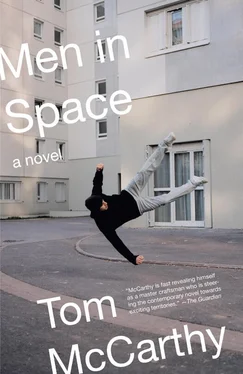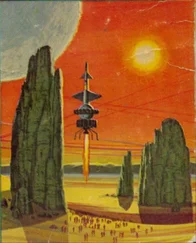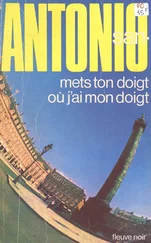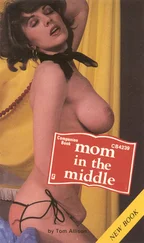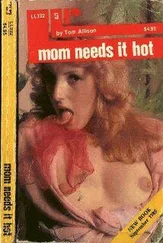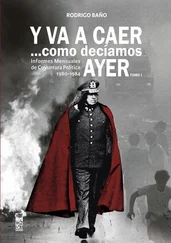“OK,” she tells him, smiling nervously and looking at the creases in his skin and thinking that she’s never seen a black guy of his age from this close back home: of course she’s seen them, but they were cab drivers or postmen or gas-pump attendants or just generally people whose faces you didn’t really clock — but here she is now with an elderly black queen who’s alluding to a world of drag bars and intercity hopping where you just go look people up when you land in such and such a town, and he’s assuming she’s part of that world too. Cool: four. And then this great black pistol. Heidi tries to sound all blasé as she asks:
“Is that a real gun?”
Tyrone’s head goes back again. Another long, long whoop.
“You’re priceless, my dear,” he sings. “She’s priceless! Karel, kiss this gorgeous girl for me.”
She looks at the blond boy, who fortunately seems not to understand. Tyrone continues:
“No, I’m only joking, my dear. Karel’s mine alone. For my eyes only,” and his big white eyes roll up. Then he gives out a theatrical kind of start or gasp as he remembers why he came over to her in the first place: “The film goes on the other spool. Here, give me that.”
He’s got the whole thing loaded in about ten seconds — which is perfect timing because just then Roger comes back followed by this tall, older guy with big white teeth, sees it’s all threaded correctly and says:
“Thank you. Did you study film?”
“My dear, she is a film,” says Tyrone. “A real star. Lights! Lights!”
While Roger’s introducing the big-toothed older guy to her as Michael who’s in advertising and she’s shaking Michael’s hand, the lights go down although not out completely: there’s a free-standing lamp over in the corner which she figures is an artist’s lamp because its glow is pretty strong. An image comes up on the bedsheet: art-house-type found footage from the Fifties of this woman in her kitchen who just turns once towards the fridge and then it starts again and then again and so you’re kind of forced to think about the gesture, i.e. turning to a fridge, and see it as a symbol or whatever, which is anyway what makes it kind of art-house. As the image comes up there’s a crackle as an amplifier is switched on. The band start playing; their front, a girl, starts singing, in English but with a totally Czech accent:
Open your eyes
To my door
I wa-ant you to …
— a song that Heidi’s heard maybe a hundred times on Radio Jedná, and really likes. As the girl sings on, she realizes with a sudden rush of excitement that these people are the real band that sing this on the radio, The Martyrdom of Somebody: she’s just met two of them at a private party, with them playing to her in the atelier of a French artist in Prague — which is, just, Cool: one zillion.
The Fifties art-house woman has escaped from her first gesture-loop, and is now tearing the leg off a pre-cooked chicken — again and again, of course. Then suddenly this lion, all Seventies and colourful, is ripping chunks of flesh from a dead zebra. Roger’s standing closer to her right side than he was two minutes earlier. Then someone moves up on her left side and nudges it: it’s Mladen the Yugoslavian, and he’s smiling at her, pushing his head forwards to the rhythm of the music. She smiles back and kind of does the same, but brings her upper torso into it more because Mladen’s moving in a way that makes him look kind of like a chicken too, and she doesn’t want to move like that, nor to seem to copy him. Bubbles are still floating down across the bedsheet screen and across the band. She has to admit it does look quite good — and anyway it wasn’t really Nick’s fault that the street-door/disconnecting-cabin-sound interface didn’t deliver: maybe someone other than Jean-Luc picked up the phone, which Nick wouldn’t have thought of, that there’d be maybe forty-fifty people there — well he’d have known that but you know, and anyway she likes him fine and Roger is his friend and Mladen the real Yugoslavian ditto. She turns around and waves up to him, hoping she won’t get Fairy Liquid or whatever in her eyes …
Nick sees her, waves back, then looks away towards a smartly dressed short guy who’s walked in from the antechamber and is also waving up at him. Nick seems to attach more importance to this guy than to her: seeing him, he screws the lid back on his kiddie bubble-tube and starts climbing down the ladder. He walks over to this guy, shakes his hand, yanks a piece of paper from his pocket and hands it to him, which seems to make the smartly dressed short guy all happy. Nick leads him over to her, kisses her on both cheeks and introduces the smartly dressed short guy to Mladen, then to Roger.
“I’ve seen you earlier today,” the smartly dressed short guy tells Roger.
“Oh yes?” Roger says.
“Palmovka. By the car market. You were taking pictures.” His accent is foreign but not Czech.
“Right,” Roger tells him. “I was filming.”
Then Nick introduces the smartly dressed short guy to her. His name is Anton, and he tells her he knows a lot about Philadelphia but not Vermont. She asks him where he’s from but the music’s quite loud and he doesn’t hear her right, because he says:
“Philadelphia. My uncle lives there. We’re going to move there too: me and my wife. We’ll have American babies.”
“Here, check this stuff out,” Nick says, holding up the tube. “It’s called ‘Bublifuk’.”
It’s true: the letters, wet with sticky liquid, swim in pink and blue across the label. International marketing potential: zero. Mladen says:
“You must go blow that over Ivan Maňásek,” and jerks his thumb towards the antechamber.
“Is that him under the duvet?” Nick asks.
Mladen smiles and nods.
“And who …”
Mladen shrugs.
“We should run a sweepstake,” Roger says. “Give odds. Everyone puts in a hundred crowns to guess who Maňásek is making underneath the duvet and whoever wins gets a year’s supply of Bublifuk.”
“Bubbly fucks for one whole year,” says Mladen, chuckling. “Yuuu!”
“I’d like to meet with Ivan Maňásek,” Anton tells Nick. “Can you introduce me to him?”
“Yes, you said. He seems quite busy at the moment.” Nick, Mladen and Roger are all falling about laughing. Heidi laughs too, to let them know she thinks it’s funny — although she doesn’t think it’s that funny, only having met this Ivan Maňásek one time, when she visited Nick in his top-floor studio with angels hanging everywhere and junk over the floor. Mladen says:
“Bursting bubbles,” and they double over some more. Sure: enough already.
The band are pretty loud: they’re almost shouting at one another. Roger points over at two kids on the far side of the room: David and Jana, twins, whose faces, Roger reckons, look like the faces of the peasants on the hundred-crown note. He’s right: they have that classic kind of Commie-heroic look — and the same face, two versions of it, one male, one female. Heidi raises her voice above the music to agree:
“They’re just like replicas of one another.” Anton says to Nick:
“So do you think Ivan Maňásek will want to take some work on for a client?” and Nick tells him:
“I think so, like I said on the phone. Get him a drink and he’ll take on anything. Is it a portrait?”
“A more religious style.”
“He told me he spent months renovating some old fresco,” Nick says. “And anyway, he graduated from the Art Academy and that’s all they teach them there. The first-year students spend their whole time copying classical and religious paintings, and when they finally get to draw models they make them stand in the same boring postures. One leg forwards, both hands on hips, like this.”
Читать дальше
